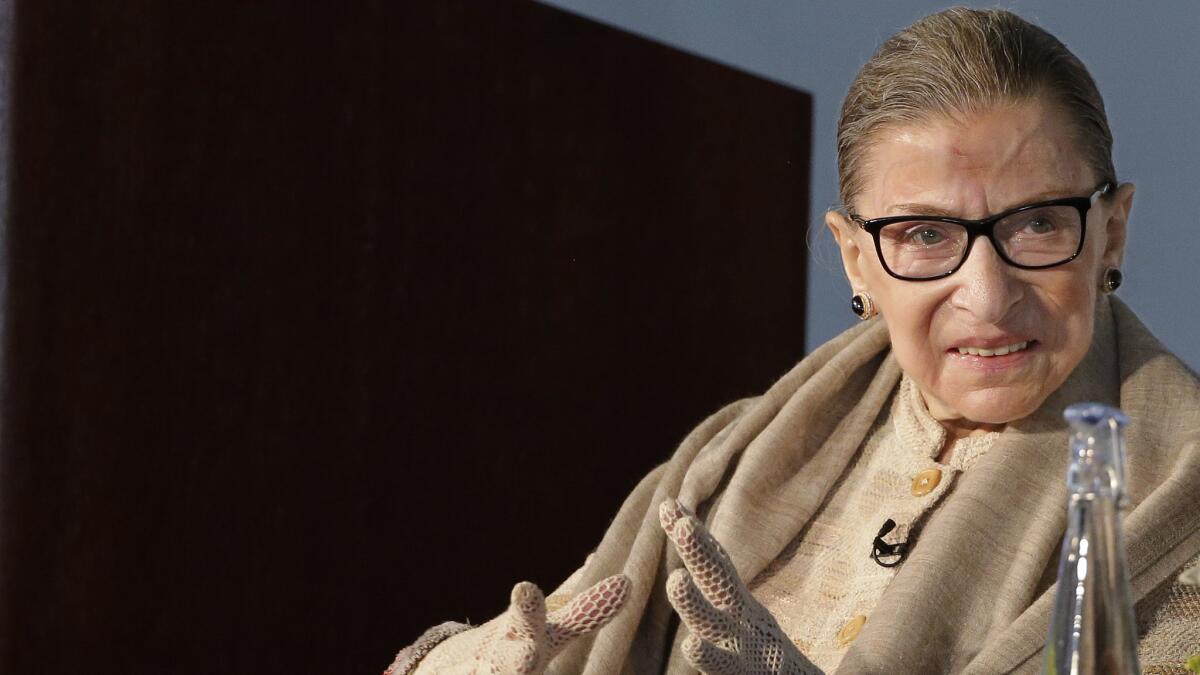Editorial: Ginsburg’s criticism of Trump is understandable but injudicious

Supreme Court Justice Ruth Bader Ginsburg participates in an interview during a luncheon at Harvard University on May 29, 2015.
- Share via
It’s not easy for us to acknowledge this, and we’d be surprised if we have much occasion to repeat it, but on one point, presumptive Republican presidential nominee Donald Trump is absolutely correct: Supreme Court Justice Ruth Bader Ginsburg’s scathing public criticism of him was “highly inappropriate.” (We don’t concur in Trump’s characteristically crass addendum that Ginsburg’s “mind is shot” and that she should resign.)
In a series of press interviews in recent days, the 83-year-old associate justice appointed by President Clinton has criticized Trump in increasingly acerbic terms. Last week, she told the Associated Press that “I don’t want to think about” the possibility that Trump might be elected. Then she told the New York Times that “I can’t imagine what this place would be — I can’t imagine what the country would be — with Donald Trump as our president. For the country, it could be four years. For the court, it could be — I don’t even want to contemplate that.” Finally, on Monday in an interview posted by CNN, Ginsburg called Trump a “faker” and noted — correctly — that “he has no consistency about him. He says whatever comes into his head at the moment. He really has an ego.”
What is wrong with Ginsburg lighting into Trump the way other Americans (including the editorial writers at this newspaper) have done?
First, although it’s an admittedly remote possibility, this year’s presidential election could land in the Supreme Court. In 2000, the court resolved questions about a recount in Florida in a way that assured that George W. Bush would be declared the winner. If the case were not Bush vs. Gore but Trump vs. Hillary Clinton, does anyone doubt that Trump would demand that Ginsburg recuse herself from the case? And he’d have a strong case.
But even if Trump vs. Clinton never makes it to court, Ginsburg’s comments threaten to politicize the judicial system in ways that ethics guidelines are designed to prevent.
The Code of Conduct for United States Judges is not technically binding on members of the Supreme Court, But, as Chief Justice John G. Roberts Jr. has written: “All members of the court do in fact consult the Code of Conduct in assessing their ethical obligations. In this way, the code plays the same role for the justices as it does for other federal judges.”
The code contains a general statement that judges should “avoid impropriety and the appearance of impropriety.” But, beyond that, it says that a judge should not “make speeches for a political organization or candidate, or publicly endorse or oppose a candidate for public office.” That applies even when there is no possibility that an election will end up in court.
Why was Ginsburg so indiscreet in her comments about Trump? The most plausible explanation seems to be that [he]... brought out the worst in the justice.
It’s entirely possible that Ginsburg, despite her public criticism of Trump, might be able to rule on a case involving his candidacy — or his policies if he were elected — in a completely objective manner. But if her objective ruling went against him, many voters would quite reasonably suspect otherwise — and, as the code states, judges are to avoid “the appearance of impropriety.”
Stephen Gillers, an expert on legal ethics at New York University Law School, made the point pithily in the New York Times: “We want the public to view judicial rulings solely as the product of law and legal reasoning, uninfluenced by political considerations. Acceptance of court rulings is undermined if the public believes that judicial decisions are politically motivated. It’s not that judges don’t disagree among themselves. But disagreements must be over legal principles, not a ruling’s effect on a political candidate or party.”
Some of Ginsburg’s defenders argue that this canon of ethics encourages hypocrisy. We all know judges have political preferences — they’re citizens, after all — so what’s the point of shrouding them in secrecy? The problem is that when a judge starts opining about politics, a significant number of litigants will doubt (or claim to doubt as a legal strategy) the judge’s impartiality. Appearances do matter — a lot — precisely because they can be misleading.
Ginsburg seemed to recognize that reality last year when she concurred in a decision upholding a rule that prevented judicial candidates from personally soliciting campaign contributions. Writing for the court in that case, Roberts reaffirmed that “public perception of judicial integrity” is “a state interest of the highest order.”
So why was Ginsburg so indiscreet in her comments about Trump? The most plausible explanation seems to be that Trump, a uniquely offensive candidate, brought out the worst in the justice. Call it Trump Derangement Syndrome. But just as Trump’s awfulness doesn’t justify violations of his or his supporters’ free speech, it doesn’t give judges who abhor his message a license to act injudiciously. If Ginsburg believes joining the campaign against Trump is a moral imperative, she should do it as a private citizen. Otherwise she should keep her own counsel.
Follow the Opinion section on Twitter @latimesopinion and Facebook
A cure for the common opinion
Get thought-provoking perspectives with our weekly newsletter.
You may occasionally receive promotional content from the Los Angeles Times.



